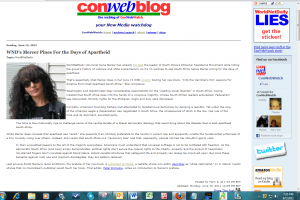The following is excerpted from y “One more Media Matters con man,” now on WND.COM:
“Terry Krepel authors a website called ConWebWatch. ‘The focus of ConWebWatch,’ Krepel declares on the site, is ‘the ConWeb—large, well-funded, Internet-based conservative ‘news’ organizations [such as] NewsMax, WorldNetDaily and CNSNews.com.’ (I’ve inserted words in parenthesis so as to alert the reader to the edit. Accurate reporting should enable readers to distinguish editorial from authorial input.)
As a biographical note, Krepel adds that he ‘became employed by Media Matters for America in July 2004.’ At his Huffington-Post perch, Krepel is duly described as a ‘Media Matters senior editor.’ Media Matters for America purports to be a ‘progressive research and information center dedicated to comprehensively monitoring, analyzing, and correcting conservative misinformation in the U.S. media.’
Our ace writer ought to have stated that he has been employed at Media Matters since 2004. ‘I became employed’ thus might be ugly English for, ‘I was once but am no longer employed by Media Matters.’ Conversely, perhaps this is a fellow whose intelligible written English is confined to the words ‘racial discrimination’?
Himself Krepel describes as ‘a veteran of 17 years in professional journalism as a newspaper writer, designer and editor. I know the ins and outs of the business and how it can be used and misused—and I see how the conservative Internet media is misusing journalism.’
His mission Krepel defines as documenting ‘the distortions, excesses and hypocrisy of these conservative media sites.’ Almost daily Krepel will dissect what Joseph Farah, Erik Rush, Aaron Klein, Jerome Corsi and others on WND.com and CNSNews.com have to say.
His method, crows Krepel, is to ‘hoist the conservative media on the petard of hypocrisy, accuracy and objectivity’ by ‘using their own words.’
Untrue; at least in my case.
Krepel has libeled me, but not by ‘using [my] own words'” … Disputes about democracy notwithstanding, there can be no disagreement over Krepel’s crappy journalism.”…
The complete column is “One more Media Matters con man,” now on WND.COM.
My new book, “Into the Cannibal’s Pot: Lessons for America from Post-Apartheid South Africa,” is available from Amazon.
A newly formatted, splendid Kindle copy is also on sale.
UPDATE I (Sep. 2): With the same ease with which Krepel left-off quotations around my original words—so as to seamlessly introduce his interpretations of those words—so too could this purveyor of crappy journalism have suddenly “added” the required quotations, once exposed. In anticipation, I have captured the original (June 12) Krepel item. The omission begins with, “Washington and Westminster,” and ends with “the disaster that is post-apartheid South Africa.” Here it is in the original:
UPDATE II: A LIBERAL’S MORAL COMPASS. Terry Krepel thinks he has hit a home run on the Facebook thread at “One more Media Matters con man.” There, Krepel implies that Eugene Terre’Blanche deserved to die, even though the old man was the non-aggressor at the crime scene, and had served his time in jail for his past transgressions (which I am not here adjudicating).
Heaven’s! I’m speechless. All Krepel has demonstrated is that left-liberals (like himself) are every bit as blood thirsty and bereft of a moral compass as the neoconservatives they often critique.
Every remotely sane individual can see where this kind of sentiment leads. And every libertarian can see why the US is in such terrible moral shape. There is no difference between affiliates of the political factions as far as ethics go. “So long as my guy is killing off the guys I dislike—I’m WINNING”: That’s the pervading mindset. Justice be damned.

